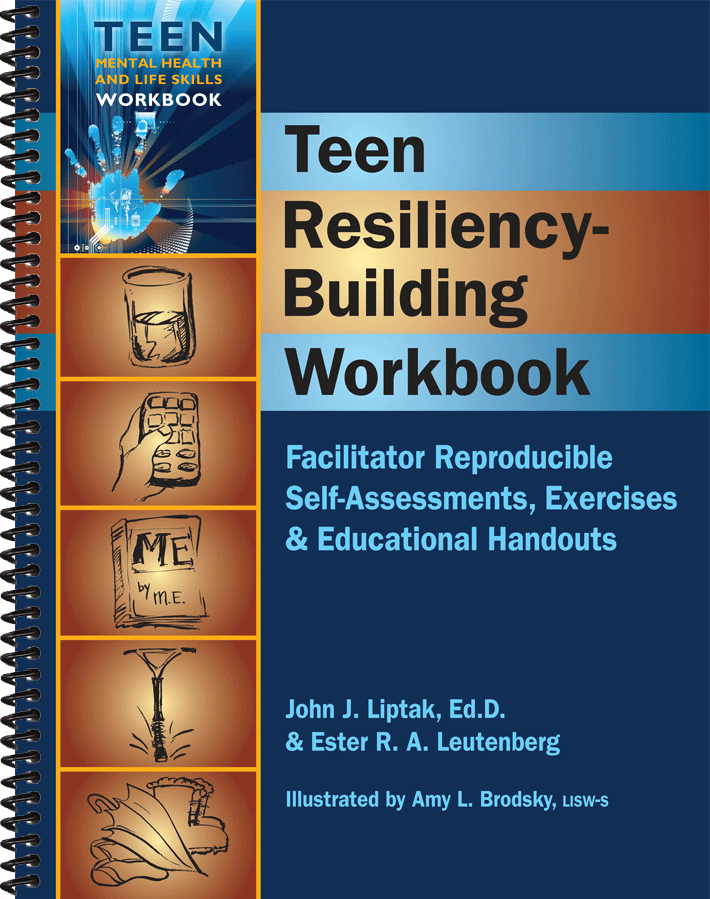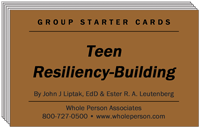Teen Resiliency-Building
Facilitator Reproducible Self-Assessments, Exercises, & Educational Handouts
Building resiliency is critical in the life of teens. It is also called other names, including hardiness, psychological resilience, emotional resourcefulness, and mental resiliency. Regardless of the name, resiliency is the ability of a teen to interact with the environment, handle stresses that occur, and bounce back from these stressful events. Resiliency promotes well-being and activates protection factors against overwhelming feelings of stress. Teens that have developed resiliency can bounce back from the negative impact of difficulties.
Resiliency is as a skill that allows teens to:
- manage life’s challenges, stresses, changes, and pressures effectively
- cope with and adapt successfully to adversity
- bounce back to a balanced state after facing a significant disruption in life or career planning
The Teen Resiliency-Building Workbook contains five separate sections to help participants learn more about themselves and how to build the resiliency which will enable them to thrive in times of adversity, change and stress. They will learn about the importance of building resiliency skills to turn change and stress into opportunities and challenges, live life zestfully, and take positive actions to live their lives with less stress.
Resiliency, or a positive behavioral adaptation, is critical when people encounter any type of trauma. Teens have an innate ability to demonstrate resiliency as they build resiliency skills in their lives. Resilient people can adapt successfully under adverse circumstances such as poverty, mental illness, disasters, terrorism, physical or psychological trauma, parents’ divorce, parent’s job loss, financial problems, family members in prison, loss of a loved one, peer pressure, physical or sexual abuse, self-induced pressure to achieve in school or a lack of safety.
Research shows that resiliency offers protection from distress and illness in the face of change or adversity. High levels of resiliency are associated with these factors: high level of happiness, self-esteem, sense of energy and vitality, optimism, self-reported health, sense of meaning and direction, and a low level of depression.
Resilient teens…
- work hard at school work and study because they enjoy it and want to achieve
- react in optimistic ways
- see problems and difficult situations as challenges
- take positive risks and actions
- think of changes as natural
- go with the flow
- have high self-esteem, self-confidence, self-concept, and sense of self
- thrive under challenging situations
- believe that they can influence events and their reactions to events
- recognize that with good stress comes growth
- have hope for their future
- overcome obstacles with confidence
- create goals and work at accomplishing them
- possess a keen sense of control over their life
- bounce back from disappointments
Research also indicates that resiliency can be built through skill development by enhancing communication, developing an optimistic outlook, building a greater sense of control, creating a more realistic sense of self, and learning to deal with change effectively. This workbook aims to provide teens with the requisite skills to manage their emotions and develop and maintain resiliency.
The five sections of the book include:
- Optimistic Outlook Scale helps teens identify how they view and live life optimistically.
- Sense of Control Scale helps teens explore the extent to which they believe they have control over what happens in their lives.
- Sense-of-Self Scale helps teens explore the strength of their self-esteem, self-confidence, and self-concept.
- Ability to Bounce Back Scale helps teens increase their ability to bounce back and recover from a setback.
- Change Management Scale helps teens become aware of how well they deal with change and develop the skills necessary to accept change.
By combining reflective assessment and journaling, participants have a powerful method of combining verbalizing and writing to reflect on and solve problems. Participants will become more aware of the strength and weaknesses of their resiliency and find ways to build and enhance their hardiness.
“This book speaks clearly and wisely to middle and high-schoolers. With the right counselor, or professional leader, I envision extremely positive outcomes for those involved with the thought-provoking scales and follow up journaling and discussion pointers.” -Eileen Regen, M.Ed., CJE
This workbook is also available in PDF eBook format, making it simple to store on your computer or mobile device and to access with a PDF viewer. The PDF format allows you to easily print copies of the activities and worksheets during therapy and counseling sessions.


